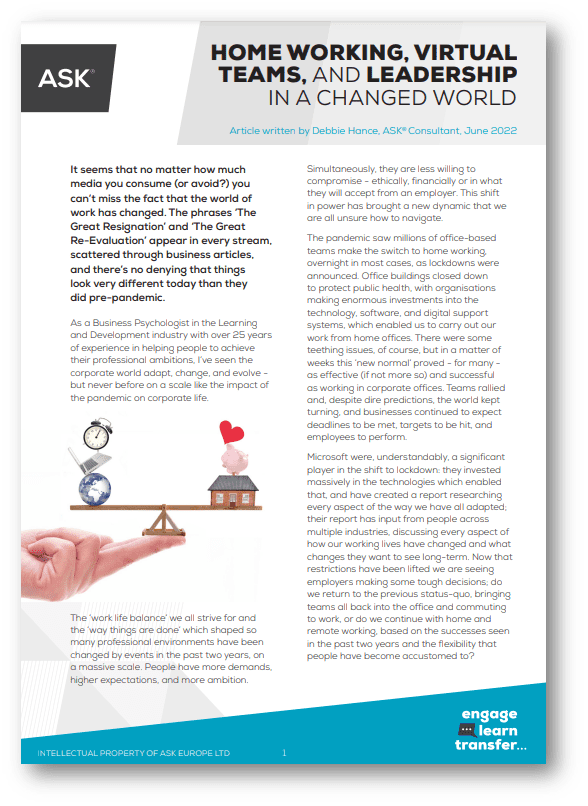Inclusivity and diversity in the workplace

Laura Kean
As International Women’s Day becomes yesterday’s news, can we truly say that enough has been done for equality, and that working women are being supported successfully in the workplace?
Monday, March 8th saw headlines celebrating women in power, with International Women’s Day an important occasion to stand firm for the rights of those who are still fighting for equality. It also saw headlines nationwide still targeting a woman who dared to stray from her lane, and to stand up for her independence and family in the process – so, as International Women’s Day becomes yesterday’s news, can we truly say that enough has been done for equality and that working women are being supported successfully in the workplace?
The Covid crisis has shown globally that powerful women can have a huge – and quite literally life-saving – impact on those they lead. Countries led by women have shown a markedly lower infection and death rate – Jacinda Ardern, Prime Minister of New Zealand, receiving global recognition for her quick, decisive response, Angela Merkel, Katrín Jakobsdóttir, and Erna Solberg, to mention merely some of the European women in political leadership, all credited for their success in controlling the spread of the virus in their countries.
These high-profile stories, championing women in positions of significant power, provide fantastic role models, as they are named as inspirations for many women working towards their own career goals – but at an organisational level, women are still not receiving all the support they need to succeed and are still facing more stumbling blocks than their male colleagues.
Yesterday’s media celebrated equality – inclusivity was the hot topic of the day, and was spoken about in every news piece and board room across the world – but talking about inclusivity is easy. Actively making a difference in the way your organisation treats your people, and ensuring that women feel valued, supported and encouraged to achieve their full potential is more challenging – and significantly more important than simply having the conversation.
As we return to the ‘new normal’, with routes out of lockdown being discussed in weekly briefings, and schools reopening so that people can return to work, how do we, as leaders and as organisations, demonstrate that we take equality, diversity and inclusion seriously?
Communication is absolutely vital; creating a safe environment for women to talk about the pressures they are under, the issues and challenges that they continue to face – really listening and not just paying lip service. It’s unrealistic and – in 2021 – unacceptable to believe that any member of your team who is looking for a healthy work/life balance or flexibility around family commitments is less valuable to the organisation. Creating a safe environment which supports those needs will not only lead to a happier workforce, it will also increase productivity if flexibility and autonomy are encouraged; if a woman (or a man, for that matter!) works part time or flexibly – respect that, embrace the skills and experience they bring to the team, and don’t be piling unachievable workloads onto someone to pressure them into presenteeism, working beyond their contracted hours or supporting a culture which disregards those who don’t over-commit.
These conversations should already be happening – but with emphasis on the listening. Not just to what your female employees are saying – but to any unconscious biases in processes, to those cultural norms and microaggressions that get labelled as ‘banter’. Don’t allow the culture to mark women as ‘other’, encourage the people in your organisation to challenge inappropriate behaviour, to call out inappropriate actions, words and gendered assumptions and language in the moment, and to make it a safe space for every employee. Don’t assume that all women want or need the same things – ask the question and listen to their requests, and treat each as an individual situation.
If you are doing the basics well – paying men and women equally, embedding working conditions that recognise that there’s not just one way of working or contributing, educating your leadership and management team to recognise that a one size fits all approach won’t bring out the best in everyone – you are already taking important steps towards success.
If, however, you recognise that there’s room for improvement, it may be time for some difficult conversations, and to consider your next steps. Recognising issues, then dealing with bad behaviour quickly and efficiently, challenging traditional ways of doing things, may not be an overnight process. A cultural shift which supports the women who work in your organisation means changing things from the top down, and making sure that your leaders and managers are trained – and supported – to have open, honest, authentic conversations with their teams. To encourage an inclusive approach, and to build trust and facilitate contribution. This mindset may not have been practiced historically, but this is the ideal time to embed some new ways of working, some changes in the interactions of your team, and to reshape some of the traditional leadership and management processes in your organisation.
As we take steps out of lockdown, a time which has impacted our lives so significantly, it’s a time to reflect. Many have realised the success of home working, flexible working, remote and virtual meetings, and recognised that these aren’t necessarily an impediment to successful business. Nor are they negative factors in development – which our success in continuing our programmes virtually has evidenced. This reflection can help you to reshape your inclusivity in your workforce.

If this is something you would like to improve in your organisation, not just for one awareness day, but every day, we can help.
Call the ASK office on 01234 757575 or email Laura directly on laura.kean@askeurope.co.uk to enquire about our Women in Leadership programmes, or to discuss any other developmental needs your team could benefit from support with.

